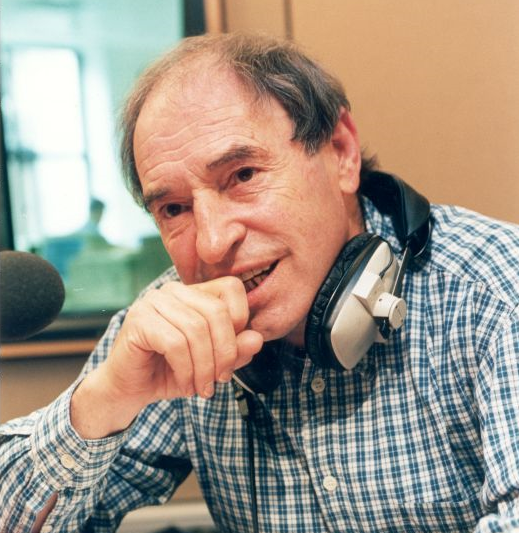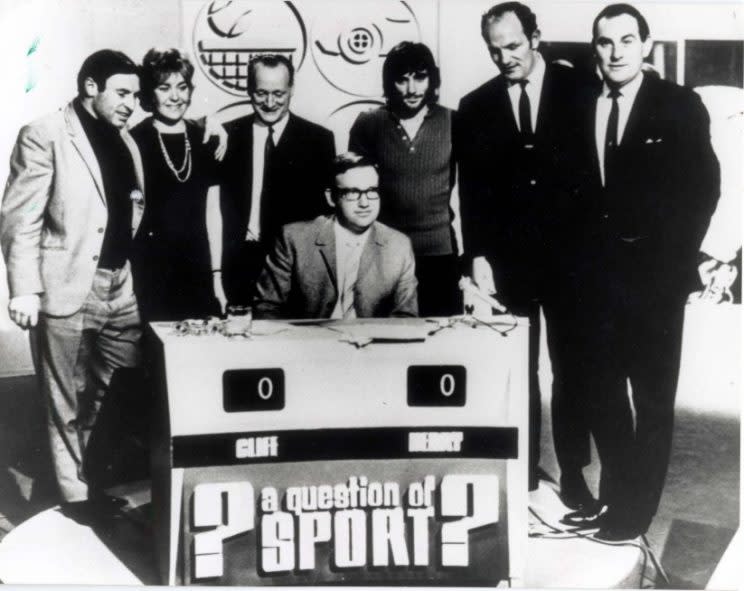Voices of Sport: Cliff Morgan - The BBC presenter who produced a magical piece of commentary for rugby's greatest ever try
In our weekly series, Yahoo Sport’s Nick Metcalfe features a famous voice of sport. On another big weekend of Six Nations rugby, the BBC presenter and commentator Cliff Morgan is the latest to go under the spotlight.

Many of the broadcasters in this series will be remembered for their distinctive voices. Cliff Morgan definitely falls into the unique category. Within seconds of hearing that special voice, you just knew you were in the best of company.
Morgan will be remembered with great fondness by viewers and listeners everywhere. He had such a lovely command of the language, and always spoke with a natural love of sport and genuine warmth. He was the television and radio equivalent of a night spent by a cozy fireside.
Morgan will of course always be most associated with rugby union. His love affair with that sport lasted a lifetime. The son of a coal miner, Morgan excelled at rugby from a young age. Soon after leaving school the fly-half joined Cardiff.
He made his Wales debut against Ireland in 1951, and was a part of the Grand Slam winning team of 1952, a triumph sealed with a dramatic 9-5 victory over France.
Morgan also played for Cardiff when they amazingly beat the mighty New Zealand 8-3 in 1953, and a month later was in the Wales team that saw off the All Blacks 13-8. Incredibly that remains the last time a Wales team got the better of New Zealand.
There’s always been something very special about a Lions tour, and Morgan was truly superb when they went to South Africa in 1955. The series was drawn 2-2, with the Lions’ 23-22 win in the second Test particularly memorable. The outstanding Morgan scored a try that day at Ellis Park, in front of a crowd of 100,000.
When skipper Robin Thompson picked up an injury ahead of the third Test, Morgan was made captain and inspired the Lions to a famous 9-6 victory. The South African press christened him “Morgan the Magnificent”.
He became captain of Wales soon after, eventually winning 29 caps, his reputation as a great of the game secure. Morgan retired from rugby in 1958. A big loss to the sport, but broadcasting was to gain enormously. And that in many ways is where our story begins.
During his career, Morgan had already shown himself to be a fine communicator. He was invited to join BBC Wales as an organiser of their sports coverage in 1960. Typically, he made an immediate impression and his talents were very much in demand.
He moved to London and worked on programmes like Sportsview. He also edited the BBC’s flagship Saturday afternoon programme Grandstand. It came as a surprise when he left the corporation, joining ITV to become editor of their well-respected current affairs programme, This Week.

But sport was his first love, and after two years with ITV, he returned to the BBC in 1966 to produce some of their biggest programmes, like Grandstand and the midweek show Sportsnight with Coleman, which I wrote about at some length when I profiled the legendary David Coleman in this series last August.
Morgan also became one of the first team captains, alongside boxer Henry Cooper, on the popular quiz show A Question of Sport. He worked very well in that role, because he always had a real sense of fun and terrific humour about him.
Morgan had become a popular national figure. He also began to commentate more, and described an unforgettable Lions tour of New Zealand in 1971. It remains the only time a Lions team has won a series against the All Blacks.
Sadly, Morgan suffered a stroke in 1972, while commentating on a rugby match for British Forces Broadcasting in Germany. His condition was life-threatening at one stage, and he spent three weeks in hospital. Thankfully he made a full recovery, and his finest hour in broadcasting came soon after.
On a cold January afternoon in January 1973, the Barbarians took on New Zealand at Cardiff Arms Park. The commentator for the game was supposed to be the great Bill McLaren, who I featured in Voices of Sport in November, but he had flu and pulled out that morning. Morgan stepped in.
The game was eagerly awaited, but nobody could have predicted the glorious moment it produced. It remains extraordinary to see 44 years on. A part of sporting folklore. The Greatest Try Ever Scored. No contest.
If you love sport, it doesn’t matter how many times you’ve seen this footage, it will still thrill and move you. And Morgan helps to make it so vivid. He speaks with exactly the right rhythm, his words matching the pictures perfectly. It’s poetic really. Those lilting Welsh tones at their magical best. Watch, listen, enjoy. Cue Cliff…
“Kirkpatrick to Williams. This is great stuff. Phil Bennett covering. Chased by Alistair Scown. Brilliant. Oh, that’s brilliant. John Williams, Bryan Williams. Pullin. John Dawes, great dummy. To David, Tom David, the half-way line. Brilliant by Quinnell. This is Gareth Edwards. A dramatic start. What a score!”
Soon after, Morgan added: “If the greatest writer of the written word would have written that story, no one would have believed it. That really was something.”
I recall the radio presenter and commentator Mike Ingham, who I profiled in this series last September, once saying that Morgan at first regretted the “What a score”, believing it to be superfluous. Doesn’t that say it all about the sheer perfectionism of those at the very top of broadcasting?
Morgan was to rise higher still at the BBC. He became Head of Radio Sport and Outside Broadcasts, and later Head of Television Sport and Outside Broadcasts. Olympic Games and World Cup finals fell under his remit, as did national events like the funeral of Lord Mountbatten in 1979 and the wedding of Prince Charles to Lady Diana at St Paul’s Cathedral in 1981.
So many special achievements in a grand career. But amid it all, I’ll always regard Morgan’s natural home as radio. There’s something so warm and intimate about that medium, and it lent itself so well to his natural charm.
I first remember hearing Morgan on Sport on 4 on a Saturday morning. The Radio 4 programme really was an ideal vehicle for the eloquent Welshman, with its diet of sporting previews and interviews. He presented Sport on 4 for 11 years.
You would very often find yourself learning something as a listener. It was in many ways the sound of calm and good sense. In this noisy world, thinking about it now really does feel like harking back to a very different time.
I particularly loved listening to the programme during sport’s great occasions. Morgan would invariably be at Aintree on the morning of the Grand National, or live at the Open Championship in the summer.
Morgan, pictured below with England manager Alf Ramsey in 1973, also presented other Radio 4 programmes My Heroes and Down The River. Listeners came to love his great enthusiasm, his unmistakable joie de vivre.

It always struck me how complimentary other broadcasters were about Morgan. They clearly relished both his company and wisdom. During the 1996 Atlanta Olympics, I recall Morgan in conversation with John Inverdale and others on the BBC Radio 5 Live team. It was clear, even as a listener, how much respect there was for him.
Morgan suffered a cruel blow in his later years, with his larynx removed and his ability to speak limited after he had cancer of the vocal cords. He died in August, 2013, at the age of 83.
Heartfelt tributes poured in from across the worlds of sport and broadcasting. Long-time presenter Des Lynam said: “Cliff was one of the most charismatic men I ever met. A brilliant broadcaster himself, his advice to those of us trying to make our way in the business was wise and invaluable. But underlying it all was his great sense of fun. ‘Enjoy yourself’ he would say, ‘It’s not working down the mine, is it?'”
Welsh rugby great Edwards, scorer of that iconic 1973 try, said: “Cliff was so eloquent and knowledgeable. He could cut anyone down in a moment if he didn’t agree with them. It was a privilege to have known him.”
The BBC broadcast special tribute programmes on television and radio. Not surprisingly, thousands of viewers and listeners spoke with great affection about Morgan too. Putting it simply, we just enjoyed his company, didn’t we? That’s what this series usually comes down to. Remembering the special broadcasters whose company we enjoyed.
We’ll always have the memories of course. Every time we see that wondrous 1973 try, we’ll hear Morgan and we’ll smile. Here’s to you, Cliff. You really were one of the good ones.

 Yahoo Sports
Yahoo Sports 
